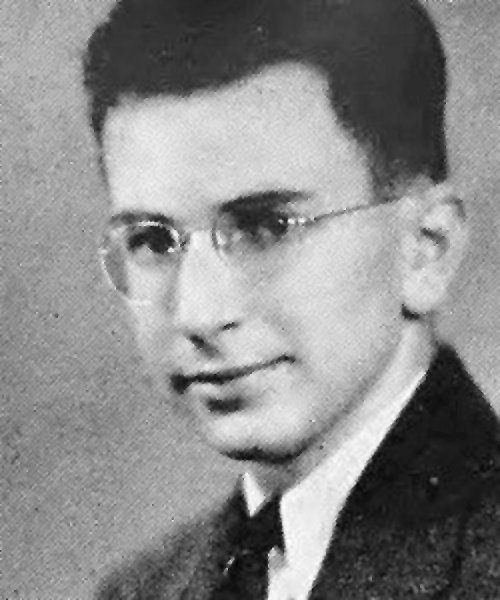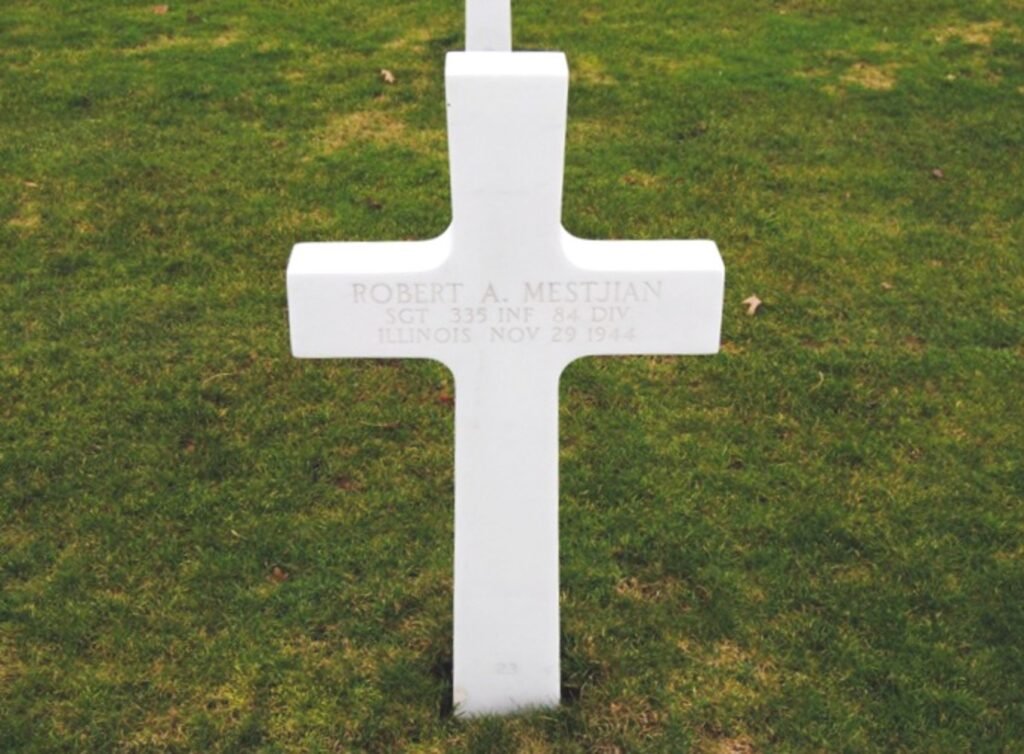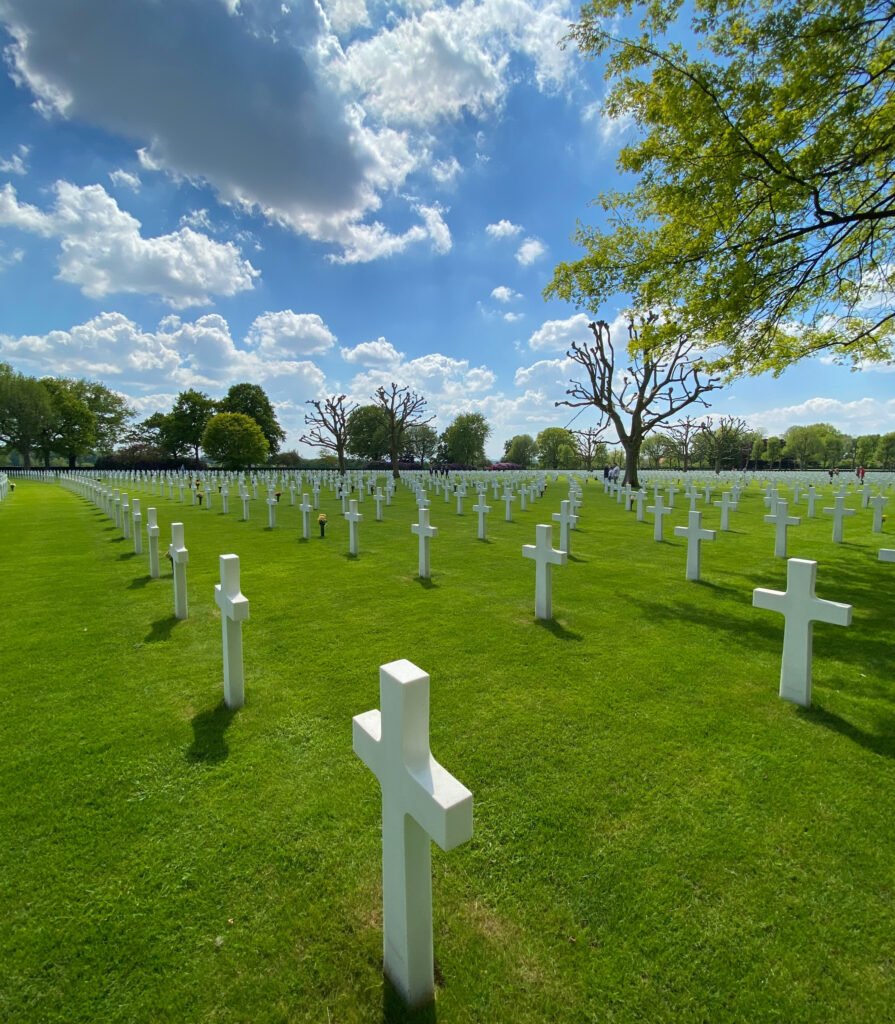
On November 29, 1944, thousands of American and British soldiers were near Lindern, a tiny German village situated near the border with the Netherlands. They were cold, soaked and exhausted by days and nights of fierce fighting. Facing them were German soldiers in bunkers and trenches, who had placed barbed wire and landmines everywhere. Every single Allied soldier knew that attacking the fortified German positions would come at a heavy cost, but they also knew the attack was inevitable. Capturing Lindern was one of the main targets of Operation Clipper, which would then enable Allied troops to gain control of the Roer valley. Among the young men waiting for the attack was Sgt Robert A. Mestjian, a 20-year-old Armenian American soldier from Illinois. Sitting there, covered in mud and scared to death, Mestjian recalled wonderful memories shared with his parents, his brother Charles and his sister Ruth. He loved his family more than anything and couldn’t bear the thought of never seeing them again.
Born a century ago, on March 25, 1924, in Evanston, Illinois, Robert was the pride and joy of Aram and Anna Mestjian, two Armenian refugees who were forced to leave their beloved land and settled in the United States. After losing all hope during the Armenian Genocide, the birth of their three children was a gift of God. Robert Mestjian was a smart and wonderful kid who loved music. He attended New Trier Township High School and learned to play the French horn. After graduating in 1942, he attended Northwestern University, where he played the French horn with the university orchestra. Like any 19-year-old kid, Mestjian had many plans, many goals and many dreams, but he was well aware that only the sacrifice of an entire generation might end the four years of war that had already killed millions of people. So he joined the U.S. Army and became a proud member of the 84th Infantry Division. Leaving his family, his home and his life was difficult, but it was time to learn how to fight and survive. After weeks of intensive military training, Mestjian crossed the ocean and landed in Normandy on November 4, 1944. He confronted German forces and discovered the horrors of war on November 18, in Geilenkirchen, Germany. A year earlier, Mestjian had been a cheerful teenager playing French horn, but in the blink of an eye, he was in combat, seeing atrocious wounds, body parts all over the battlefield and young men like himself dying everywhere.
A few days later, on November 29, 1944, Mestjian and his brothers-in-arms reached Lindern and found themselves in front of an impenetrable wall. Breaking through those fortified German positions seemed impossible. Everything was quiet and peaceful, but that brief moment of peace was just the calm before the storm. When the order of the attack was finally given, all hell broke loose. Many American and British soldiers were struck by enemy fire and fell to the ground, but Mestjian and his comrades kept moving forward and gave everything they had. Against all odds, they broke through the German lines and captured the village of Lindern, but Mestjian didn’t make it. He was killed during the final part of the assault and died at the age of 20. Mestjian’s family never recovered from his death. From the moment they received the telegram informing them that Mestjian had been killed in action, they realized that nothing would ever be the same. Mestjian’s mother passed away only six years after her son’s death. His father died in 1971. Mestjian’s sister Ruth became a clerk typist for the Washington National Insurance Company in Evanston, and passed away in 2001. After serving his country during World War II, Mestjian’s brother Charles opened several stores in Illinois, including “Mestjian Carpets” in Wilmette. Charles passed away in 2009.

Mestjian is now resting in peace at the Netherlands American Cemetery in Margraten, Netherlands. Over the past 80 years, Mestjian has been far from home and his relatives, but he has been very well taken care of. Many Europeans have forgotten their liberators, and the price that was paid for their freedom, but not the Dutch. Since 1945, Dutch people have adopted war graves at the Netherlands American Cemetery. Every adopter visits the adopted soldier several times a year and lays flowers to express a never-ending gratitude. Flowers are laid on the birthday or dying day of the adopted soldier. When possible, the adopter keeps in contact with the adopted soldier’s next of kin, letting them know that someone is constantly looking after their loved one. Today, the 8,288 American heroes buried at the Netherlands American Cemetery are all adopted, and there are more than 3,000 Dutch people on a waiting list to pursue this remarkable duty of remembrance. The waiting list is continuously growing, because many parents have passed on the adoption to their children and grandchildren, which is why so many young people can be found among the adopters. In addition to this wonderful tradition, dozens of tributes and ceremonies are organized every year to honor Allied heroes of World War II. At Christmas, thousands of school children visit war cemeteries to honor the young men who gave their lives to liberate the Netherlands. All across the country, many parks and streets have been named after American and British heroes who made the ultimate sacrifice. All these tributes have a common goal – making sure that all the Allied heroes buried in the Netherlands are remembered by current and future generations.

On this very special day, Mestjian would most likely want us to honor his fallen Armenian American comrades who are also resting in peace at the Netherlands American Cemetery. Among them are: Pvt Harry Arpajian (Cleveland, Ohio), Sgt Steven Goushakjian (Providence, Rhode Island), 1st Lt Antrony Zakarian (Detroit, Michigan), CWO Stanley Maligian (Brockton, Massachusetts) and PFC Ohannes Sariyan (Binghamton, New York). These young men had friends, parents, girlfriends and so much to live for, but they all gave their lives to save our world and eradicate the deadly ideology that killed so many children, couples and families.
Mestjian only spent 20 years on earth, but in his short existence, he made such a big difference. To defeat tyranny and liberate Europe, every single battle mattered, every single act of courage counted, and every single sacrifice enabled the final victory. People often say that time erases everything, but we cannot let time erase the sacrifice made by Mestjian and all the Armenian American heroes who died at war for us to live in peace. By keeping Mestjian’s story alive, maybe in 2124, someone among the Armenian diaspora will remember this young man and wish him a happy 200th birthday.



Another wonderful article. Rest in peace Robert. Your memory and legacy will live on.
Excellent article. Thanks John. I have visited the Netherlands many times and can confirm that the Dutch have not forgotten their liberators. Happy Birthday Robert.
RIP brave warrior. I am always amazed at the respect the Dutch have for our beloved war heroes.
Thank you John Dekhane. Dutch people have a special place and respect in my heart.
Job well done John. I look forward to reading your stories. Sad stories? Yes. But you have a way with words.
Seems as if Sgt. Robert Mestijian and his brothers in arms will live on forever.
Had it not been for your article John Dekhane, I would not have known of Robert Mestjian and known that Pvt Harry Arpajian (Cleveland, Ohio), Sgt Steven Goushakjian (Providence, Rhode Island), 1st Lt Antrony Zakarian (Detroit, Michigan), CWO Stanley Maligian (Brockton, Massachusetts) and PFC Ohannes Sariyan (Binghamton, New York), are also buried in the Netherlands American Cemetery and also of this wonderful Dutch tradition of adopting an interred of the “Greatest Generation”. Thank you.